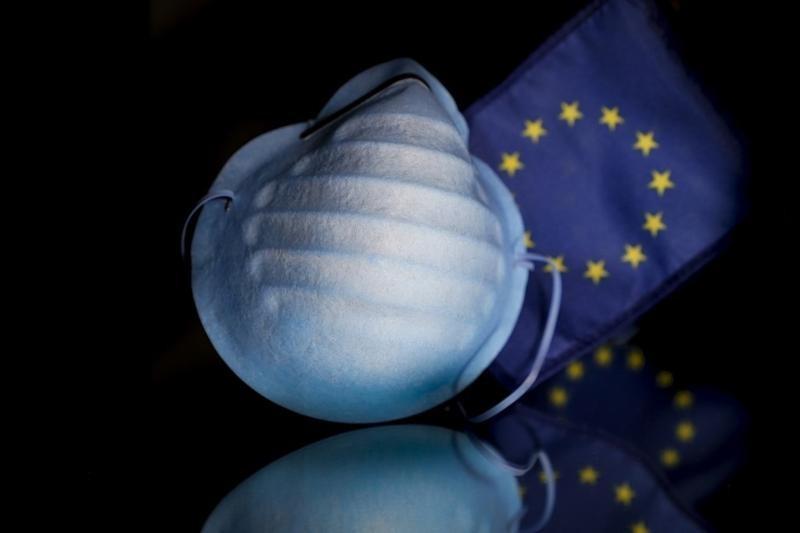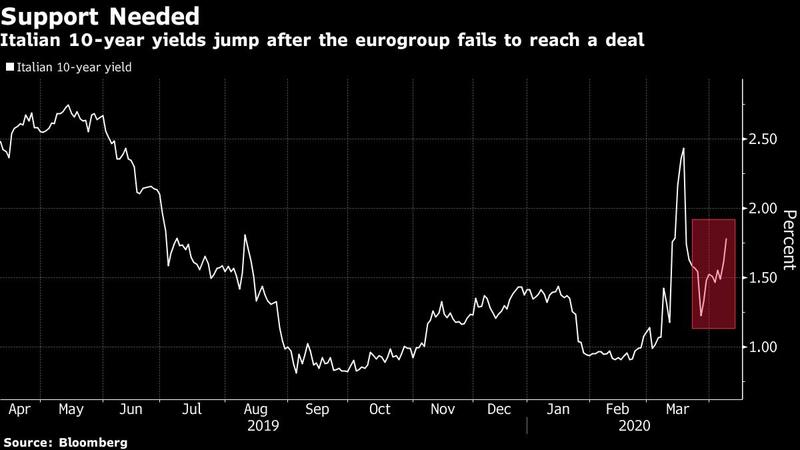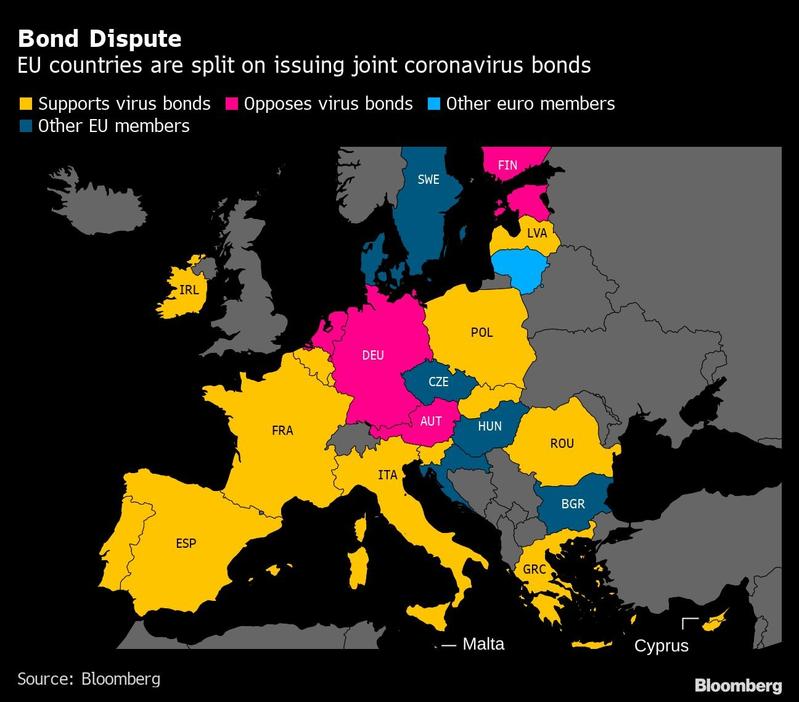 This photo taken on Feb 27, 2020 in Brussels shows a protective face mask displayed to a European flag. (PHOTO / AFP)
This photo taken on Feb 27, 2020 in Brussels shows a protective face mask displayed to a European flag. (PHOTO / AFP)
European Union finance ministers failed to agree on a 500 billion-euro (US$543 billion) package to mitigate the economic impact of the pandemic, prolonging a paralysis that casts doubt over the bloc’s ability to weather the crisis. Italian bonds fell.
Faced with what could be the deepest recession on record, the acrimony highlights how Europe is mired in the same old divisions that almost tore it apart during the sovereign debt crisis almost a decade ago
In an emergency teleconference that lasted more than 16 hours, finance chiefs couldn’t reconcile their contrasting visions for the steps needed to help European economies recover, as countries in the continent’s hardest-hit south were pitted against hawkish northern states over sharing the costs of the looming recession.
Faced with what could be the deepest recession on record, the acrimony highlights how Europe is mired in the same old divisions that almost tore it apart during the sovereign debt crisis almost a decade ago. A new call is scheduled for Thursday, though it’s unclear what could push countries to move from their red lines, not least because a massive intervention by the European Central Bank has taken off some of the market pressure to strike a compromise.
Two officials familiar with the discussion said the main reason for the breakdown was a dispute between the Netherlands and Italy over the conditions attached to the potential use of credit lines from the euro area’s bailout fund to finance the spending spree needed to cushion the blow from the pandemic. Ministers also sparred over the wording of a joint statement hinting at the possible issuance of joint debt to finance the response.
Italian bonds fell, with 10-year yields climbing as much as 18 basis points to 1.80 percent, the highest level since March 19. The euro fell against most of its group-of-10 peers, dropping 0.4 percent to US$1.0852.

French Finance Minister Bruno Le Maire and his German counterpart Olaf Scholz sent tweets after the meeting broke down, saying they would work with one another and calling on all European nations to rise to the “exceptional challenge” to reach an ambitious accord. Scholz later told reporters that an agreement was close and hoped one would be reached before April 12.
The ministers had been tasked by EU leaders to come up with a toolkit of measures to address the economic impact of the pandemic by the end of this week. But even as the virus continued to engulf their economies and medical systems they were unable to move past traditional dividing lines, putting in question the next steps in the continent’s efforts to manage the economic downturn.
Three main proposals are being discussed to weather the crisis: employing the European Stability Mechanism, the euro-area’s bailout fund, to offer credit lines worth up to 2 percent of output of the bloc’s members; the creation of a pan-European Guarantee Fund to be managed by the European Investment Bank that could mobilize more than 200 billion euros (US$217 billion) in liquidity for companies; as well as an employment reinsurance scheme worth 100 billion euros.

The French government also put forward a plan that would create a temporary reserve worth 3 percent of EU gross domestic output, have a lifetime of as long as 10 years, and would be funded by the joint issuance of debt to mutualize the cost of the crisis. The plan is controversial as it resembles an idea backed by several euro-area countries for so-called coronabonds -- joint debt instruments that would ease pressure on highly indebted countries like Italy and, to a lesser extent, Spain and France.
While Germany has said that it supports measures to bolster an economic recovery, it has balked at any proposals that would see member states sharing debt. Other countries such as the Netherlands and Austria also oppose joint issuance, wary that they could end up on the hook for spending in the poorer south.
“The Netherlands was, is and remains against #eurobonds because this increases risks in Europe instead of reducing them,” Dutch Finance Minister Wopke Hoekstra tweeted on Wednesday, adding that countries couldn’t agree on attaching conditionality to the ESM lines of credit. “To the extent that the ESM is used for economic support, we think it wise to link it to taking economic measures.”
A roadmap to compromise remains tricky, as the members states are hewn in by political considerations that give them very little room to maneuver.
ALSO READ: Report: EU commissioners, Spain urge common debt plan
Italy doesn’t want to be seen as ceding to Northern Europe during a time of national crisis, especially since the ESM has become a popular target for euroskeptic politicians, acording to a government official. And while they’re optimistic a deal can be reached, the path will be difficult if Germany and others don’t make a substantial concession on joint bonds, said the official, who asked not to be identified discussing private matters.
“I hope the government won’t accept ESM, it would be illegal and senseless,” opposition leader Matteo Salvini told reporters. “If the Italian government, without the OK of parliament and therefore of citizens, accepts ESM, it will do so outside the law and of common sense, putting at risk the savings, the property and the future of Italians.”
Borrowing Costs
The new EU package comes on top of measures taken by the European Central Bank to shore up the bloc’s economy.
The ECB was slower to react to the coronavirus than its major peers but eventually stepped in with a 750 billion euro bond-buying program announced on March 18. Policy makers exempted those purchases from most of the rules that constrain earlier programs, allowing them to better help stressed economies such as Italy and Greece.
Combined with other measures, the ECB will spend more than a trillion euros on a wide range of public and private debt this year to push down borrowing costs and help governments finance any fiscal response. It has also offered banks ultra-cheap funding on the proviso they lend it on to virus-hit companies.
READ MORE: 'Things under control': How EU sleepwalked into the virus crisis


